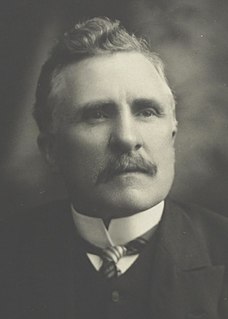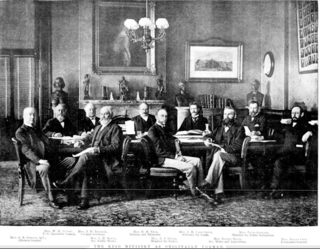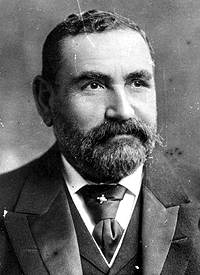
The Australian Labor Party (ALP), also simply known as Labor, is the major centre-left political party in Australia, one of two major parties in Australian politics, along with the centre-right Liberal Party of Australia. The party forms the federal government since being elected in the 2022 election. The ALP is a federal party, with political branches in each state and territory. They are currently in government in Victoria, Queensland, Western Australia, South Australia, the Australian Capital Territory, and the Northern Territory. They are currently in opposition in New South Wales and Tasmania. It is the oldest political party in Australia, being established on 8 May 1901 at Parliament House, Melbourne, the meeting place of the first federal Parliament.

The prime minister of Australia is the head of government of the Commonwealth of Australia. The prime minister heads the executive branch of the federal government of Australia and is also accountable to federal parliament under the principles of responsible government. Anthony Albanese of the Labor Party became prime minister on 23 May 2022.

Sir Edmund "Toby" Barton, was an Australian politician and judge who served as the first prime minister of Australia from 1901 to 1903, holding office as the leader of the Protectionist Party. He resigned to become a founding member of the High Court of Australia, where he served until his death.

The Parliament of Australia is the legislative branch of the government of Australia. It consists of three elements: the monarch, the Senate and the House of Representatives. The combination of two elected chambers, in which the members of the Senate represent the states and territories while the members of the House represent electoral divisions according to population, is modelled on the United States Congress. Through both chambers, however, there is a fused executive, drawn from the Westminster system.
The Protectionist Party or Liberal Protectionist Party was an Australian political party, formally organised from 1887 until 1909, with policies centred on protectionism. The party advocated protective tariffs, arguing it would allow Australian industry to grow and provide employment. It had its greatest strength in Victoria and in the rural areas of New South Wales. Its most prominent leaders were Sir Edmund Barton and Alfred Deakin, who were the first and second prime ministers of Australia.

The Australian Government, also known as the Commonwealth Government, is the national government of Australia, a federal parliamentary constitutional monarchy. Like other Westminster-style systems of government, the Australian Government is made up of three branches: the executive, the legislative, and the judicial.

Sir John Quick was an Australian lawyer, politician and judge. He played a prominent role in the movement for Federation and the drafting of the Australian constitution, later writing several works on Australian constitutional law. He began his political career in the Victorian Legislative Assembly (1880–1889) and later won election to the House of Representatives at the first federal election in 1901. He served as Postmaster-General in the third Deakin Government (1909–1910). He lost his seat in 1913 and ended his public service as deputy president of the Commonwealth Court of Conciliation and Arbitration (1922–1930).

The Division of Newcastle is an Australian electoral division in the state of New South Wales.

Alexander Poynton OBE was an Australian politician. He held ministerial office under Prime Minister Billy Hughes, serving as Treasurer (1916–1917), Minister for Home and Territories (1920–1921), and Postmaster-General (1921–1923).

The 1901 Australian federal election for the inaugural Parliament of Australia was held in Australia on Friday 29 March and Saturday 30 March 1901. The elections followed Federation and the establishment of the Commonwealth of Australia on 1 January 1901. All 75 seats in the Australian House of Representatives, six of which were uncontested, as well as all 36 seats in the Australian Senate, were up for election.

The politics of Australia take place within the framework of a federal parliamentary constitutional monarchy. Australia has maintained a stable liberal democratic political system under its Constitution, one of the world's oldest, since Federation in 1901. Australia is the world's sixth oldest continuous democracy and largely operates as a two-party system in which voting is compulsory. The Economist Intelligence Unit rated Australia a "full democracy" in 2021. Australia is also a federation, where power is divided between the federal government and the states and territories.
In Australian political and constitutional terminology, a caretaker government is a government of Australia from when the House of Representatives is dissolved by the Governor-General prior to a general election to a period after the election, until the next ministry is appointed. A caretaker government is expected to conduct itself in accordance with a series of well-defined conventions administered by the Department of the Prime Minister and Cabinet, but there is no law compelling the caretaker government to do so.
The following is a list of members of the Western Australian Legislative Assembly between the 1897 elections and the 1901 elections, together known as the Third Parliament.

The 1900 and 1901 United States Senate elections were elections in which both the Republicans and the Democrats gained two seats in the United States Senate at the expense of various third parties and vacancies, and which corresponded with President William McKinley's re-election as well as the 1900 House of Representatives elections.

The Reid ministry was the 28th ministry of the Colony of New South Wales, and was led by the 12th Premier, George Reid. The title of Premier was widely used to refer to the Leader of Government, but was not a formal position in the government until 1920. Instead the Premier was appointed to another portfolio, usually Colonial Secretary but on this occasion Reid took the portfolio of Colonial Treasurer until July 1899 and then Attorney General.

The See ministry was the 30th ministry of the New South Wales Government, and was led by the 14th Premier, Sir John See. The title of Premier was widely used to refer to the Leader of Government, but was not a formal position in the government until 1920. Instead the Premier was appointed to another portfolio, usually Colonial Secretary.

Maiwar is an electoral district of the Legislative Assembly in the Australian state of Queensland, incorporating the inner western suburbs of Brisbane. It was created in the 2017 redistribution, and was first contested at the 2017 Queensland state election. The electorate name is stated by the Government as being named based on an aboriginal name of the Brisbane River, however it is not the name that the Turrbal people who lived in the Brisbane region had for the river. The Brisbane River forms the southern boundary of the electorate.